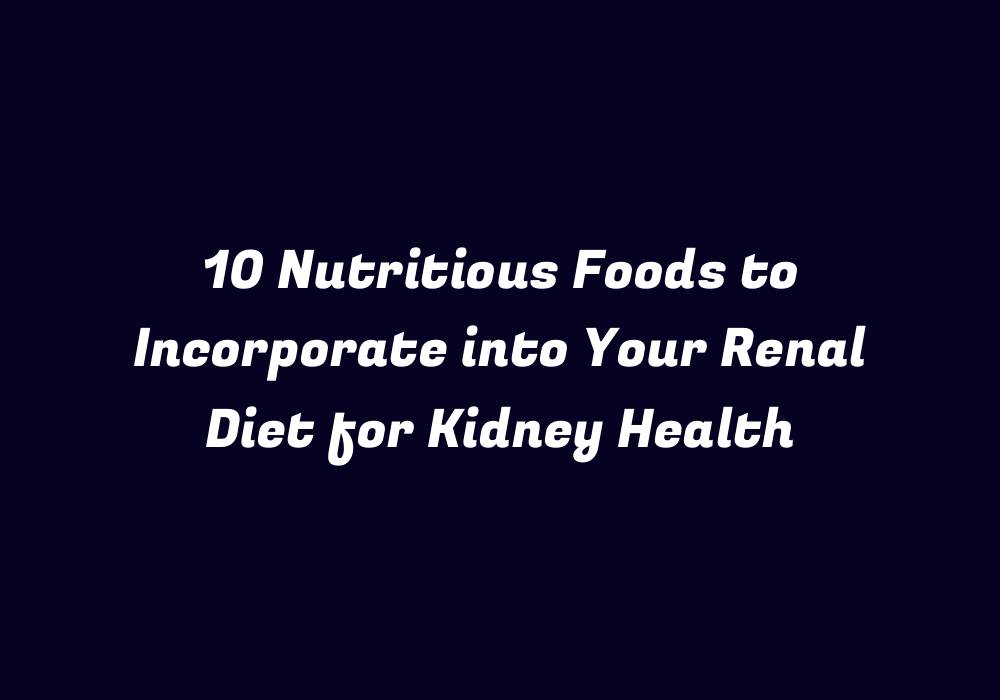10 Nutritious Foods to Incorporate into Your Renal Diet for Kidney Health
Introduction
A proper renal diet plays a vital role in maintaining kidney health and promoting overall well-being. For individuals with chronic kidney disease (CKD), it is crucial to adopt certain dietary changes to help manage the condition. Incorporating nutritious foods into your daily meals can not only improve your kidney function but also contribute to a healthy lifestyle. In this article, we will discuss ten essential food items that are suitable for a renal diet and their health benefits related to kidney care.
1. Berries
Berries such as blueberries, raspberries, and blackberries are rich in antioxidants and vitamins while being low in potassium, phosphorus, sodium, and sugar. These nutrient-dense fruits can provide a variety of health benefits for people with kidney issues. They promote heart health by reducing inflammation, improve cognitive function, and may help prevent certain types of cancer due to their high antioxidant content.
2. Nuts
Nuts are a great source of healthy fats, fiber, protein, vitamins, minerals, and antioxidants. They also contain moderate amounts of potassium and phosphorus. Almonds, walnuts, and cashews are some popular nut options that can be enjoyed in small quantities. Including nuts in your renal diet may help lower blood pressure, reduce cholesterol levels, and contribute to weight loss or maintenance.
3. Legumes
Beans, peas, chickpeas, and lentils are all part of the legume family, which offers numerous health benefits due to their high fiber, protein, and low fat content. These foods can be included in your renal diet as long as you consider their moderate potassium and phosphorus content. Legumes promote heart health, aid in weight management, and may reduce blood sugar levels by providing a steady source of energy.
4. Green Leafy Vegetables
Leafy greens like spinach, kale, collard greens, and Swiss chard are an excellent addition to any renal diet. They provide essential vitamins (A, C, E, K), minerals (iron, calcium, magnesium), antioxidants, and fiber while being low in potassium, phosphorus, sodium, and sugar. These nutrient-dense vegetables can support bone health, promote weight loss, reduce the risk of chronic diseases, and improve brain function.
5. Low-Fat Dairy Products
Choose low-fat dairy options like skim milk or reduced-fat cheese to help manage potassium and phosphorus levels in your renal diet. Consuming these nutritious foods can provide essential nutrients such as calcium, protein, and vitamins A and D while promoting bone health and maintaining a balanced diet.
6. Whole Grains
Whole grains like oats, brown rice, quinoa, and whole-wheat pasta can provide important nutrients such as fiber, vitamins (B1, B3), minerals (magnesium, iron, zinc), and antioxidants. They also contain lower levels of phosphorus compared to refined grains. Whole grains may help reduce the risk of chronic diseases, support heart health, and promote weight management.
7. Fish
Fish is an excellent source of protein, essential fatty acids (omega-3), vitamins, and minerals while being low in phosphorus and moderate in potassium. Seafood such as salmon, tuna, and trout can provide numerous health benefits for people with kidney issues, including supporting heart health, enhancing brain function, and reducing inflammation.
8. Lean Meats and Poultry
Choose lean meats like chicken, turkey, and beef to limit the intake of sodium, fat, and phosphorus while providing essential nutrients such as protein and vitamin B12. These foods can be beneficial for individuals with CKD by promoting heart health, supporting muscle function, and helping maintain bone density.
9. Fruit Juice
While fruits are generally good for your renal diet, fruit juices may contain high amounts of sugar and calories. It is important to choose low-sugar options like cranberry or apple juice or consume freshly squeezed juice with minimal added sugars. These juices can provide vitamins and antioxidants while supporting heart health and promoting weight management in individuals with kidney issues.
10. Herbs and Spices
Herbs and spices are a great way to add flavor to your meals without relying on excessive salt, which can help control blood pressure in people with CKD. Additionally, certain herbs like turmeric and cinnamon offer antioxidant properties that may support overall health. These seasonings make it easier to adhere to a renal diet while enjoying the taste of your food.
Conclusion
Incorporating nutritious foods into your daily meals is crucial for maintaining kidney health, especially if you have CKD. By focusing on fruits, vegetables, whole grains, lean proteins, low-fat dairy products, and herbs while limiting intake of phosphorus-rich items, you can create a balanced diet that supports your overall wellbeing and promotes healthy kidney function. It’s essential to consult with your healthcare professional to develop the most suitable meal plan based on your specific needs and medical condition.
